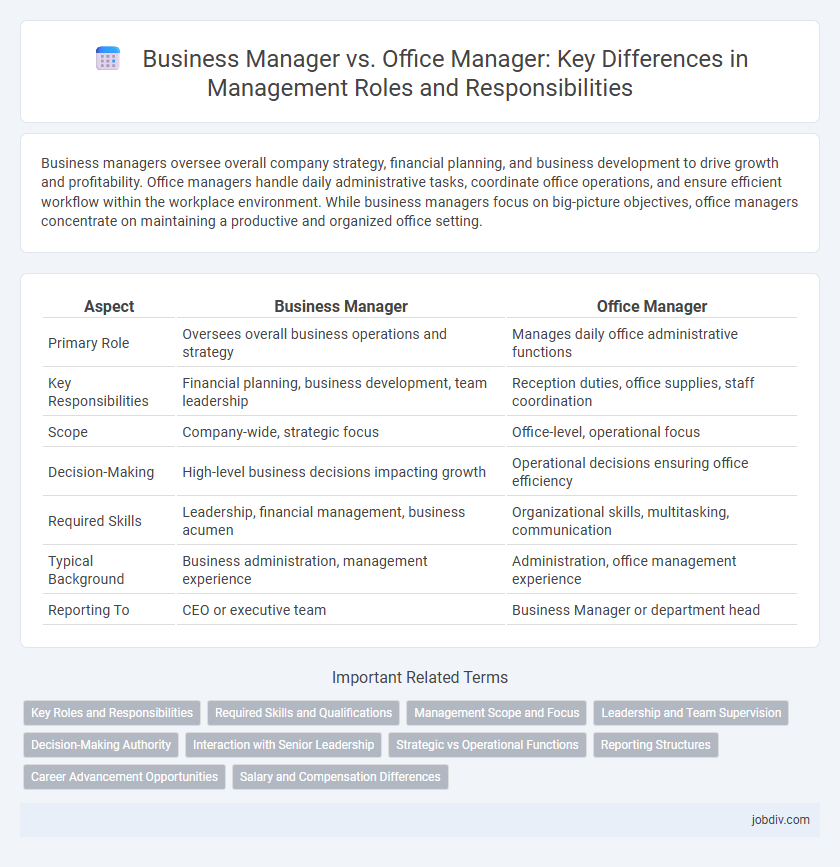Business managers oversee overall company strategy, financial planning, and business development to drive growth and profitability. Office managers handle daily administrative tasks, coordinate office operations, and ensure efficient workflow within the workplace environment. While business managers focus on big-picture objectives, office managers concentrate on maintaining a productive and organized office setting.
Table of Comparison
| Aspect | Business Manager | Office Manager |
|---|---|---|
| Primary Role | Oversees overall business operations and strategy | Manages daily office administrative functions |
| Key Responsibilities | Financial planning, business development, team leadership | Reception duties, office supplies, staff coordination |
| Scope | Company-wide, strategic focus | Office-level, operational focus |
| Decision-Making | High-level business decisions impacting growth | Operational decisions ensuring office efficiency |
| Required Skills | Leadership, financial management, business acumen | Organizational skills, multitasking, communication |
| Typical Background | Business administration, management experience | Administration, office management experience |
| Reporting To | CEO or executive team | Business Manager or department head |
Key Roles and Responsibilities
Business Managers oversee overall company operations, including strategic planning, financial management, and team leadership to drive business growth. Office Managers handle daily administrative tasks, such as coordinating office activities, managing supplies, and ensuring efficient workflow. Both roles require strong organizational skills, but Business Managers focus on high-level decision-making while Office Managers ensure smooth office functionality.
Required Skills and Qualifications
Business Managers require strong leadership, strategic planning, and financial acumen to drive company growth, along with a bachelor's degree in business administration or related fields. Office Managers need exceptional organizational, communication, and multitasking skills to oversee daily operations, often supported by experience in office administration or a relevant certification. Both roles benefit from proficiency in project management software and problem-solving abilities, but the Business Manager focuses more on high-level decision-making while the Office Manager concentrates on administrative efficiency.
Management Scope and Focus
Business Managers oversee the strategic direction, financial health, and overall growth initiatives of a company, managing multiple departments and aligning operations with long-term goals. Office Managers focus on the day-to-day administrative functions, ensuring efficient office workflow, managing support staff, and maintaining organizational logistics. The management scope of Business Managers is broader, emphasizing business development and resource allocation, whereas Office Managers concentrate on operational efficiency and workplace environment.
Leadership and Team Supervision
Business Managers drive strategic vision and overall performance by leading multiple departments and aligning goals with company objectives. Office Managers focus on daily operations and team supervision within a specific office environment, ensuring smooth workflow and administrative efficiency. Strong leadership in Business Managers emphasizes decision-making and cross-functional collaboration, while Office Managers excel in managing interpersonal dynamics and immediate team coordination.
Decision-Making Authority
Business managers possess broader decision-making authority, overseeing strategic planning, resource allocation, and overall business performance. Office managers primarily handle operational decisions related to daily administrative tasks, staff coordination, and office environment management. The distinction in decision-making authority reflects the scope and impact of their respective roles within an organization.
Interaction with Senior Leadership
Business Managers often act as strategic liaisons with senior leadership, presenting financial reports, performance metrics, and growth opportunities to influence high-level decision-making. Office Managers typically focus on operational support, facilitating smooth communication between staff and executives by managing schedules, coordinating meetings, and ensuring administrative efficiency. The interaction of Business Managers with senior leadership is generally more data-driven and strategic, whereas Office Managers provide essential organizational support that enables leadership to focus on core business goals.
Strategic vs Operational Functions
Business Managers focus on strategic functions such as long-term planning, market analysis, and resource allocation to drive overall organizational growth. Office Managers handle operational tasks including daily office administration, coordinating staff activities, and maintaining workflow efficiency. The distinction lies in Business Managers shaping company direction while Office Managers ensure smooth execution of routine processes.
Reporting Structures
Business managers typically oversee multiple departments and report directly to senior executives or the board of directors, ensuring alignment with strategic goals. Office managers usually report to department heads or business managers, focusing on the efficient operation of day-to-day administrative functions. Clear reporting structures enhance communication flow and accountability within an organization's management hierarchy.
Career Advancement Opportunities
Business Managers typically have broader career advancement opportunities due to their responsibility for strategic planning, financial oversight, and cross-departmental leadership, which prepares them for executive roles such as Director or VP of Operations. Office Managers, while crucial for daily administrative efficiency, generally advance within operational or administrative frameworks, often moving towards roles like Administrative Manager or Facilities Manager. Understanding these distinct pathways helps professionals align their skills and ambitions with the appropriate managerial trajectory for long-term career growth.
Salary and Compensation Differences
Business Managers typically earn higher salaries than Office Managers due to broader responsibilities, often ranging from $70,000 to $120,000 annually compared to Office Managers' $45,000 to $75,000. Business Manager compensation packages frequently include performance bonuses, profit sharing, and stock options, reflecting their strategic role. Office Managers generally receive fixed salaries with occasional performance-based incentives and benefits focused on administrative efficiency.
Business Manager vs Office Manager Infographic

 jobdiv.com
jobdiv.com